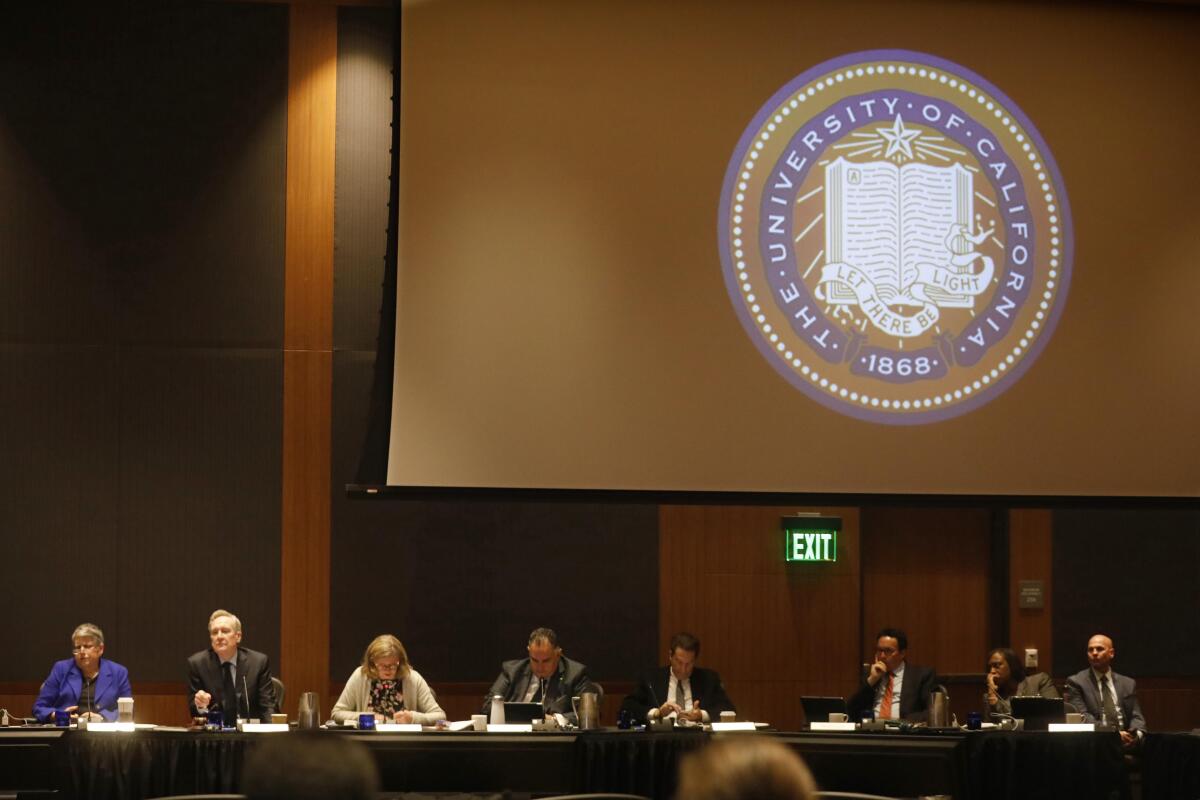Students accused of sexual harassment sue California universities

- Share via
He was a University of California graduate student who said he dated another student twice — and was shocked when she accused him of stalking and sexual harassment in a Title IX complaint in 2017.
The UC system substantiated her allegations, he said, and suspended him for two years in June 2017, reducing the sanction to three months on appeal.
But the accused student is fighting back — not only for himself but for potentially hundreds of others, predominantly men, in similar straits.
This week, he filed a class-action lawsuit in Alameda County against the 10-campus UC system, arguing that the procedures used to find him and other students responsible for sexual misconduct are unfair and failed to provide them due process. A male Cal State Fullerton student filed a similar class-action lawsuit last month against the 23-campus California State University system.
“This class action seeks to clear the records of those who’ve been wrongfully punished by this deeply flawed disciplinary system,” said Mark Hathaway, a Los Angeles attorney representing the UC and Cal State Fullerton students, identified as John Does in court filings.
UC and Cal State officials say they believe their Title IX processes are fair, respectful to all parties and comply with state and federal law. Both systems recently issued new policies and procedures to strengthen due process protections for accused students, as courts have ordered and U.S. Education Secretary Betsy DeVos has proposed in new Title IX rules.
The lawsuits mark an emerging strategy by students accused of sexual misconduct to use class-action lawsuits to force universities to set aside, en masse, findings and sanctions that led to their suspension or expulsion. The nation’s first class action was filed July 5 against Michigan State University, followed by Cal State on July 16 and UC this week. The Cal State and UC lawsuits cover all students who were suspended or expelled since June 2015, when both systems issued new Title IX policies that sought to be more sensitive to victims.
Brett Sokolow, president of the Assn. of Title IX Administrators, called class action a “clever approach” that would make legal action accessible to potentially thousands of students unable to afford personal lawsuits. He said more than 300 students across the nation have filed lawsuits challenging their Title IX outcomes, but he estimated that as many as 20,000 students at the nation’s 4,500 colleges may have been disciplined for sexual misconduct.
UC and Cal State data on the number of students who have been suspended or expelled for sexual misconduct were not immediately available. Attorneys estimate that more than 500 UC students could potentially be affected, with even more at the larger Cal State system.
“If one case succeeds,” Sokolow said, “it opens the floodgates for others.”
The class-action strategy relies on recent appellate court rulings in California and Ohio that ordered universities to provide students the opportunity for cross-examination at hearings before a neutral adjudicator.
The California court, in a January ruling in a USC case, held that “fundamental fairness” required colleges and universities statewide to provide those due process protections to students who are subject to severe disciplinary sanctions in cases that turned on questions of credibility — he-said, she-said situations, for instance.
In the Cal State Fullerton case, the university notified John Doe that a female student had filed a sexual misconduct complaint against him about one month after their alleged encounter. He denied any misconduct.
The university investigated and substantiated the allegation, expelled him and denied his appeal in a June 2017 decision by the systemwide Title IX coordinator, the lawsuit said. The university said it complied with Cal State policy and state law in place at the time.
However, for the class-action lawsuits to proceed, the courts must first agree that the proposed class of students can be clearly defined, have suffered the same alleged injuries and share a common legal interest. Courts have yet to certify the class in any of the lawsuits, and a Cal State spokeswoman said university officials don’t believe they should.
“The CSU is still analyzing the lawsuit, but upon initial review, it does not appear that a class action is appropriate or legally justifiable,” said Toni Molle, Cal State spokeswoman. “Each Title IX case is distinctive with individualized facts and has unique interests for the individual parties.”
The UC system has not yet been served with the lawsuit and has no comment, spokeswoman Claire Doan said Friday.
Both Cal State and UC have recently issued new Title IX policies and procedures to comply with the appellate court ruling to allow cross-examination at hearings and end the practice of allowing a single investigator to interview witnesses, gather evidence and determine facts and findings about whether the allegations are true.
In response to the ruling, all students are now entitled to a hearing before a neutral decision maker on Title IX complaints.
UC and Cal State handle the process slightly differently.
Under UC’s new policies issued this week, any student dissatisfied with preliminary determinations and proposed sanctions can request a hearing. Previously, hearings were in granted only in limited circumstances.
Cal State will provide hearings in all cases before determining whether sexual misconduct occurred. Previously, hearings were held only after sanctions had been proposed.
Both systems will offer videoconferencing or other means of physical or visual separation to reduce the potential for trauma at the hearing. They also will allow only indirect cross-examination through questions submitted by both sides to the hearing officer, who may choose not to ask any deemed irrelevant or harassing.
In addition, Cal State has curtailed the role of investigators so they only will gather testimony and evidence, but no longer decide if allegations are true. A hearing officer will make that decision.
UC investigators will offer preliminary determinations of whether sexual misconduct allegations are true, and student conduct officers will then propose sanctions if warranted. But the accused and accuser have the right to contest those proposed decisions and ask for a hearing.
Suzanne Taylor, UC’s systemwide Title IX coordinator, said a university working group consulted widely and took several months to carefully craft a revised model.
“We had to provide a process that was fair, that treats parties with respect and compassion and that results in just and reliable outcomes,” she said. “We also knew we had to minimize the burden on our students as well as the vulnerability of our decisions being overturned by the courts. We really have to hold the values of fairness and compassion equally close as we move forward, and that’s what we will do.”
Hathaway, the attorney representing the two students, said the revised policies still fall short. He said they continue to prevent accused students from presenting a “full defense” by barring, for instance, direct cross-examination by their representatives, as DeVos’ proposed rules would allow.
Taylor, however, said UC had no intention of allowing that practice at the moment.
“It really does create an adversarial process, and it would make our process much more like a criminal proceeding,” she said, “and so that’s something that we absolutely will not do unless we have to.”
She said that university disciplinary procedures are very different from criminal charges and trials, where consequences can be far more severe. It is not clear how many students report sexual misconduct allegations to police; Taylor said many choose not to because it can be an “arduous process” that may not result in a prosecutorial decision to file charges.
More to Read
Sign up for Essential California
The most important California stories and recommendations in your inbox every morning.
You may occasionally receive promotional content from the Los Angeles Times.











